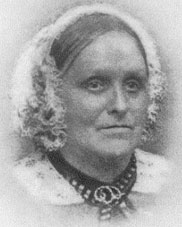Susanna Moodie facts for kids
Quick facts for kids
Susanna Moodie
|
|
|---|---|
 |
|
| Born | Susannah Strickland 6 December 1803 Bungay, River Waveney, Suffolk |
| Died | 8 April 1885 (aged 81) Toronto, Ontario |
| Occupation | Author |
Susanna Moodie (born Strickland; 6 December 1803 – 8 April 1885) was an English-born Canadian author. She is famous for writing about her experiences as a settler in Canada. At the time she lived, Canada was a British colony.
Contents
Susanna Moodie's Life Story
Susanna Moodie was born in Bungay, England, in 1803. She was the youngest sister in a family of writers. Her sisters included Agnes Strickland and Catharine Parr Traill.
Susanna wrote her first children's book in 1822. She published other children's stories in London. These included books about historical figures like Spartacus. She also worked with the Anti-Slavery Society. She wrote down the story of Mary Prince, a former Caribbean slave.
In 1831, she married John Moodie. He was a retired officer from the Napoleonic Wars.
Moving to Canada
In 1832, Susanna, her husband, and their daughter moved to Upper Canada. This area is now part of Ontario. They settled on a farm in Douro township. This was near Lakefield, north of Peterborough.
Her brother, Samuel Strickland, worked nearby as a surveyor. He founded a museum that now holds artifacts about their family. Susanna's elder sister, Catharine, also moved to the same area. Catharine was also a writer.
Life in the Canadian Wilderness
Susanna Moodie continued to write in Canada. Her letters and journals tell us a lot about life in the colony. She wrote about the "backwoods" of Ontario. This included native customs and the local wildlife. She also wrote about the climate.
She described how Canadians and American settlers got along. She noted the strong sense of community. People often worked together in groups called "bees." Susanna, however, did not enjoy these gatherings.
In 1836, there was an economic downturn. Her family faced financial difficulties. Her husband served in the militia during the Upper Canada Rebellion in 1837. This was a time of political unrest.
As a middle-class Englishwoman, Moodie did not like living in "the bush." In 1840, she and her husband moved to Belleville. She called this place "the clearings."
She learned about the Family Compact. This was a powerful group of people in Upper Canada. She supported moderate reformers like Robert Baldwin. But she was critical of more radical reformers. This caused problems for her husband. He was the sheriff of Belleville and had to work with the Family Compact.
Famous Books
In 1852, Susanna Moodie published Roughing it in the Bush. This book described her experiences on the farm in the 1830s. The next year, in 1853, she published Life in the Clearings Versus the Bush. This book was about her time in Belleville.
Her greatest literary success was Roughing it in the Bush. Her editor suggested she write a guide for British people moving to Canada. Moodie wrote about the challenges she faced as a "New Canadian." She wanted to prepare people like herself, who were not used to farm life, for what Canada would truly be like.
Susanna taught her daughter Agnes how to paint flowers. Agnes later illustrated a book called Canadian Wild Flowers, published in 1868.
Susanna Moodie lived in Belleville after her husband died. She lived to see Canadian Confederation, when Canada became its own country. She died in Toronto in 1885 and is buried in Belleville Cemetery.
Susanna Moodie's Legacy
Susanna Moodie's books and poems have inspired other famous writers.
Inspiration for Other Authors
Her work inspired Margaret Atwood's poetry collection, The Journals of Susanna Moodie, published in 1970. It also influenced Atwood's novel, Alias Grace. This novel was based on a story from Moodie's Life in the Clearings Versus the Bush.
Carol Shields also wrote a book about Moodie's work. The main character in Shields' novel, Small Ceremonies, is even writing a biography of Moodie.
Commemorative Postage Stamp
On 8 September 2003, Canada Post released a special postage stamp. It was part of a series called "The Writers of Canada." This stamp honored Susanna Moodie and her sister Catharine Parr Traill. Three million stamps were issued to celebrate Canadian writers.
What Susanna Moodie Wrote
Novels
- Mark Hurdlestone – 1853
- Flora Lyndsay – 1854
- Matrimonial Speculations – 1854
- Geoffrey Moncton – 1855
- The World Before Them – 1868
Poetry
- Patriotic Songs – 1830 (with Agnes Strickland)
- Enthusiasm and Other Poems – 1831
Children's Books
- Spartacus – 1822
- The Little Quaker
- The Sailor Brother
- The Little Prisoner
- Hugh Latimer – 1828
- Rowland Massingham
- Profession and Principle
- George Leatrim – 1875
Memoirs
- Roughing it in the Bush – 1852
- Life in the Backwoods; A Sequel to Roughing It in the Bush
- Life in the Clearings Versus the Bush – 1853
Letters
- Letters of a Lifetime – 1985 (edited by Carl Ballstadt, Elizabeth Hopkins, and Michael Peterman)
Images for kids
- Moodie, Susanna. Life in the clearings versus the bush. London : Richard Bentley, 1853. Accessed 18 July 2012, in PDF format.


